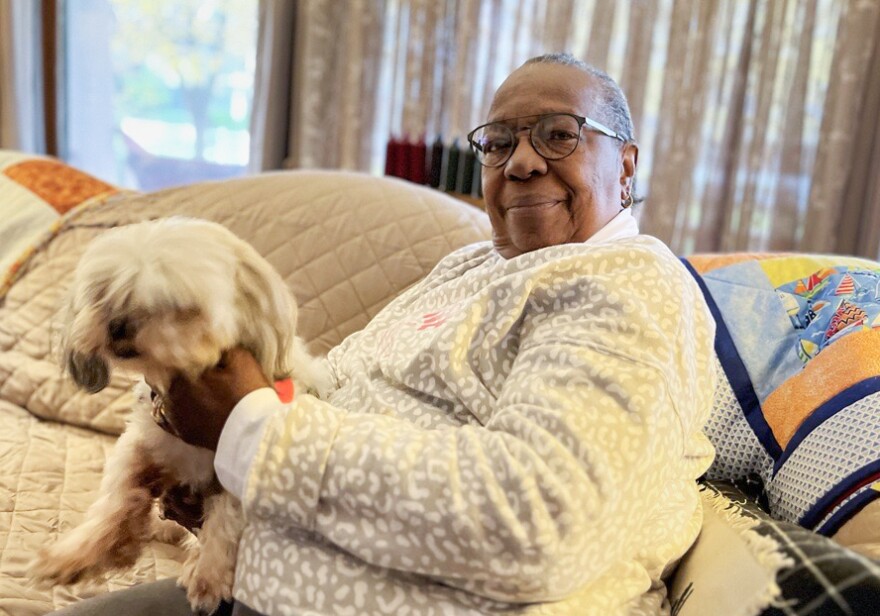
Laughter echoes through Shiela Searles-Fairey's home in the 19th Ward as she summarizes this stage of her life.
"I'm not your normal old person, OK?" she said "I'm an old lady that lives with a crazy-ass dog in the center of the city with no fear."
But at 74, Searles-Fairey also knows how it feels to be overlooked because of her age.
That's the unspoken message she thinks she's had from prospective employers, starting when she was around her mid-50s. Her career has spanned higher education counseling, corporate recruiting, and, most recently, addiction counseling at Lifespan.
"I had applied for several positions that I was more than qualified for and didn't hear any response," she said. "And when I followed up: 'Thank you, but no thank you.' "
As a Black woman, Searles-Fairey said she is accustomed to racial discrimination. Given the male-dominated workplaces in the era in which her career started, she is also familiar with sexual discrimination.
And now that she's older, "I got the triple whammy," she said.
The local business community is just one target of a "Reframing Aging" campaign by the Monroe County Aging Alliance, a group of local organizations promoting the value and well-being of older adults.
As a follow-up to its 2022 action plan for an age-friendly community, the coalition entered a partnership with the Gerontological Society of America and the National Center to Reframe Aging. The goal of the grassroots campaign is to eliminate myths and outdated notions about older adults and redefine what it means to age.

Trying to influence a cultural shift is a daunting goal, Alliance co-director Leanne Rorick admits.
"We're aware of that," she said. "But if we don't start, then it's never going to start."
When the Aging Alliance researched what an age-friendly community would look like, there was a resounding theme among the older adults they heard from in work groups and on discussion boards.
They want to be included more. And not just in the workplace.
If the initiative is successful, Rorick believes older adults will be appreciated, both as consumers and employees.
"There's some poverty in our community that's forcing older adults to remain in the workforce longer,” she said. “But there are also people that want to work longer, so we would like to be sure that businesses have respect for older workers."
According to a 2020 Alliance survey, more than 1 in 4 Monroe County residents over the age of 60 said they wanted to continue working.
With worker shortages across multiple economic sectors, Rorick argues that older adults are needed to fill jobs. She would like to see employers allowing older employees to gradually reduce their hours so they can continue to contribute as they transition into retirement.
"Why lose all of that wonderful knowledge?" she asked.
Another objective of the Reframing Aging initiative is to challenge ageist perspectives among health care providers.
"Over and over, we hear from older adults that the doctor didn't take them seriously," Rorick said. "The doctor assumed that they weren't going to be active because they were 85 and didn't really want to look at the fact that their knees were not working well enough for them to be able to walk and enjoy the things they wanted to do."

Polly McCarthy, a 78-year-old retired school teacher from Victor, recalled a recent interaction with a pharmacist at a local drug store. She was talking to him about a medication she was prescribed.
"When I asked this one question,” she said, “he kind of looked at me and went, 'Duh!' "
McCarthy said she went back to the pharmacy the next day to tell the pharmacist his response made her uncomfortable.
"And he was full of apologies," she said. "But I just didn't think he would probably do that to someone who was younger."

So how does the Aging Alliance think it can shift ageist attitudes?
One way they hope to do it is by training community members on ways to view and communicate with and about older adults. The idea is to have these facilitators spread the message within their workplaces and beyond, and eventually train others to do the same.
The trainees are from 15 local organizations affiliated with aging, such as Common Ground Health and the University of Rochester Aging Institute.
Francesca Padilla is a program officer at United Way of Greater Rochester. At 39, she's one of the younger facilitators.
She thinks the needs of older adults are often framed as a burden to society.

"A separate group of people that we need to put fires out for, versus individuals who are part of our community," as she put it.
Padilla is a published author of Young Adult fiction, another platform from which she can reach younger generations. She hopes to challenge what she believes is a core reason for ageist attitudes.
"I think, a lot of the time, when people talk in a derogatory way about getting old, they're really talking about, like, this fear of mortality that people have," she said.
After they finish their training next month, Rorick hopes the facilitators will take a hard look at their organizations' own Diversity Equity and Inclusion programs.
She cites a Harvard Review report indicating that only 10% of businesses include aging as part of their DEI efforts.
The Reframing Aging campaign will also include presentations to groups or individuals and promotional messaging, perhaps through a social media campaign.
Later in the year, facilitators will evaluate their success.
The way McCarthy sees it, people don't even have to be altruistic in their motives.
"If you're lucky, you're all going to get old, so do what you can to make it comfortable for you when you get there," she laughed. "That's my war cry."



